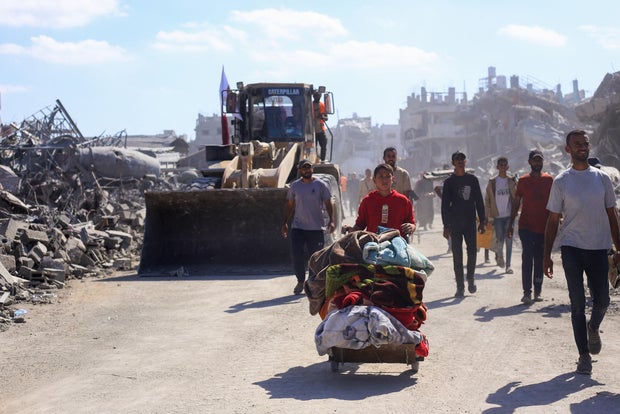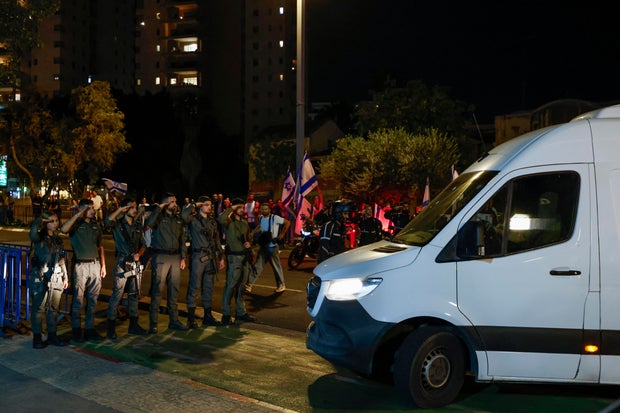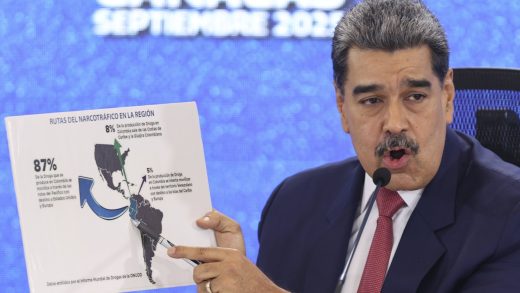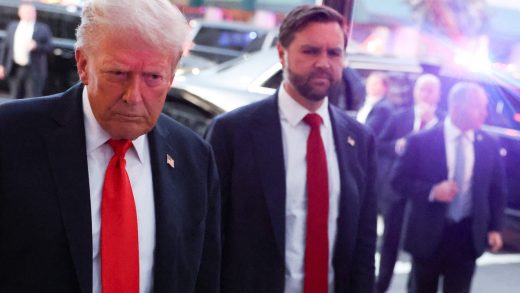Monday brought tears of joy and of pain in Israel and Gaza, as all of the living Israeli hostages and four of those who died in captivity were handed over by Hamas in exchange for the release of nearly 2,000 Palestinian detainees and prisoners held by Israel. But as the ceasefire brokered by President Trump held on Tuesday, there were a number of unresolved issues testing his plan to turn it into a sustainable peace.
Thousands of desperate Gazans were still waiting for vital humanitarian supplies, and the families of 24 deceased Israeli hostages were still anxiously awaiting the return of their loved ones’ remains.
Leaders around the world welcomed Monday’s developments as the first step in the U.S. brokered plan. Mr. Trump has said the deal can end not only the two-year war in Gaza, but bring lasting peace to the region after eight decades of conflict and violence.
But there is an enormous amount of work to do, not only in building trust across the Middle East, but to rebuild the coastal Gaza Strip to make it inhabitable for its roughly 2 million Palestinian residents.
Calls to open Gaza’s borders for aid to flood in
Mr. Trump’s 20-point peace plan said “full aid” would “be immediately sent” into Gaza as part of the first phase of the deal, but multiple organizations say the flow of aid materials has not ramped up nearly fast enough.
The International Red Cross added its voice Tuesday to the growing chorus of organizations calling for all border crossings into the enclave to be opened immediately to allow in more aid.
“Not all entry points are open to get humanitarian aid inside Gaza. And that’s the main issue right now. And that’s what humanitarians, including the ICRC, have been calling for in the last hours, is making sure that because of the huge needs, all entry points can be open,” Red Cross spokesman Christian Cardon told reporters in Geneva on Tuesday.
AFP via Getty
Dr. Yahya al-Sarraj, the Mayor of Gaza City, the territory’s biggest population center, told CBS News’ team in Gaza on Tuesday that the shattered metropolis desperately needs building materials, as well as humanitarian relief and even tents to provide temporary accommodation.
“Everything is needed here,” Al-Sarraj, who has recently described himself as politically independent and never as a member of Hamas, told CBS News. “We need heavy machinery. We need building materials, especially cement … and all kinds of food for the people to help them counter the starvation that happened during the past two years.”
“There is also a special need to provide tents immediately to allow people to have some place to shelter,” the mayor added.
United Nations Under-Secretary-General for Humanitarian Affairs and Emergency Relief Coordinator Tom Fletcher said Monday that an additional $11 million was being allocated by the U.N. for humanitarian relief in Gaza, “bringing the total to $20 million, to deliver food, water, shelter and health services, and keep essential infrastructure running.”
Israeli security officials told CBS News on Sunday that about 600 humanitarian aid trucks operated by U.N. agencies would be allowed to enter Gaza daily under the ceasefire, though it remains unclear whether the traffic has reached that level since the fighting stopped on Friday.
Delivering aid to the famine-stricken Gaza Strip will be challenging, given the widespread devastation in the densely populated region, Hani Almadhoun, senior director of philanthropy for a charity that supports the U.N. agency for Palestinian refugees, UNRWA, told “CBS Mornings” on Tuesday.
“One of the challenges is the roads are broken. There’s ditches. It’s hard to drive trucks on those roads,” said Almadhoun, who also founded the Gaza Soup Kitchen charity. “I think in the next few days, things will get better. I hope everyone keeps their end of the deal so the Palestinians can catch a break.”
Remains of deceased hostages yet to be returned
The peace plan called for Hamas to return all hostages, 28 dead and 20 living, but on Monday, Hamas handed over the remains of only four deceased Israeli captives.
The return of the outstanding remains has become a serious sticking point, which could both endanger the ceasefire and progress toward implementing the next phases of Mr. Trump’s peace plan.
The Hostages and Missing Families Forum, which represents Israeli hostage families, voiced anger that all of the bodies had not been returned on Monday and called for the suspension of the Israel-Hamas peace agreement “until every deceased individual is returned.”
In an open letter to White House Middle East senior envoy Steve Witkoff on Tuesday, the forum called on the U.S. to leave “no stone unturned in demanding that Hamas fulfil their end of the agreement and bring all of the remaining hostages home.”
JALAA MAREY/AFP/Getty
Israel’s Defense Minister Israel Katz said Monday that Hamas’ return of only four bodies, “constitutes a violation of the agreement,” in a social media post, adding that “any delay or deliberate avoidance will be considered a gross violation of the agreement and will be responded to accordingly.”
During the negotiations that led to the ceasefire, Hamas representatives said they did not know the location of all the remains of deceased hostages, according to Israeli media reports.
Speaking Monday in Egypt, President Trump also said not all of the bodies of the deceased hostages had been found, adding that unidentified parties were still “working out” how to locate an unspecified number of remains.
In a statement confirming the return of the four sets of remains on Monday, the Israel Defense Forces said it and other Israeli agencies would “continue to make every effort to return all the hostages, and are preparing for the continued implementation of the agreement.”
“Hamas is required to fulfill its part of the agreement and make the necessary efforts to return all the hostages to their families and to proper burial,” the IDF statement added.
Gal Hirsch, the Hostage and Missing Persons Coordinator for the Israeli Prime Minister’s Office, told CBS News last week that an international team would be established to locate missing hostages in Gaza, but details as to who will form that team and when it might begin its work remained unconfirmed on Tuesday.



